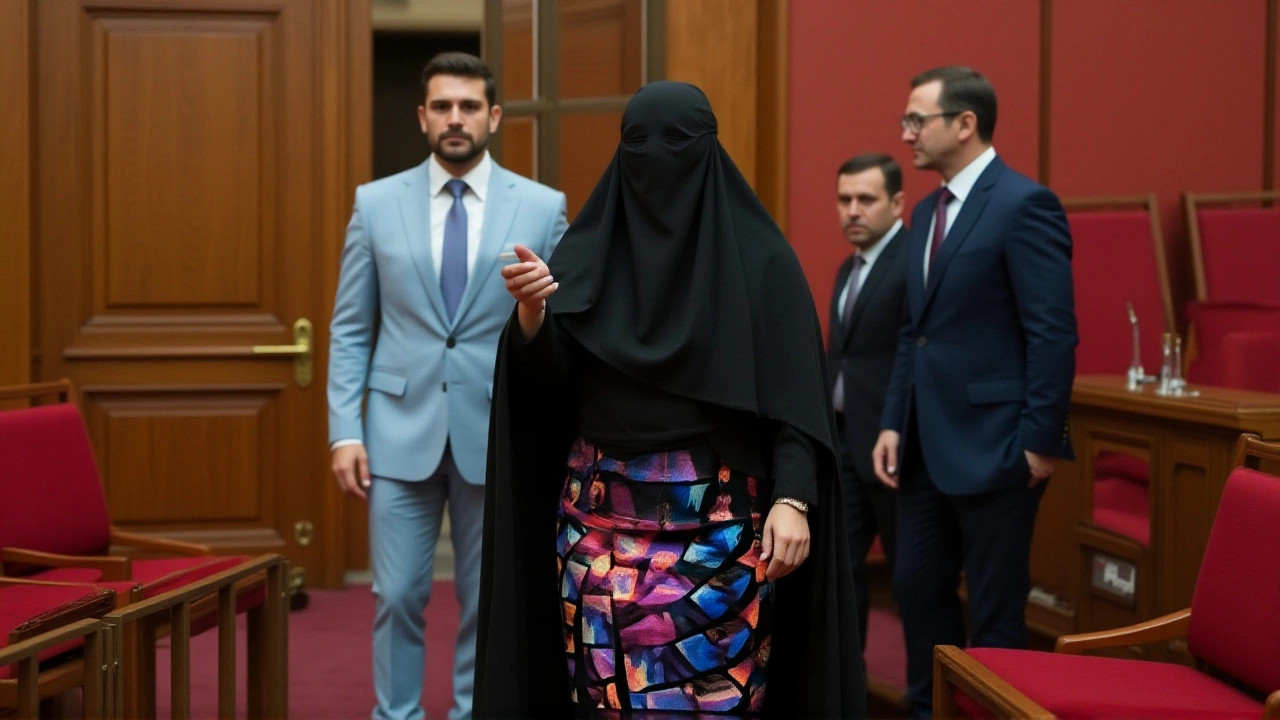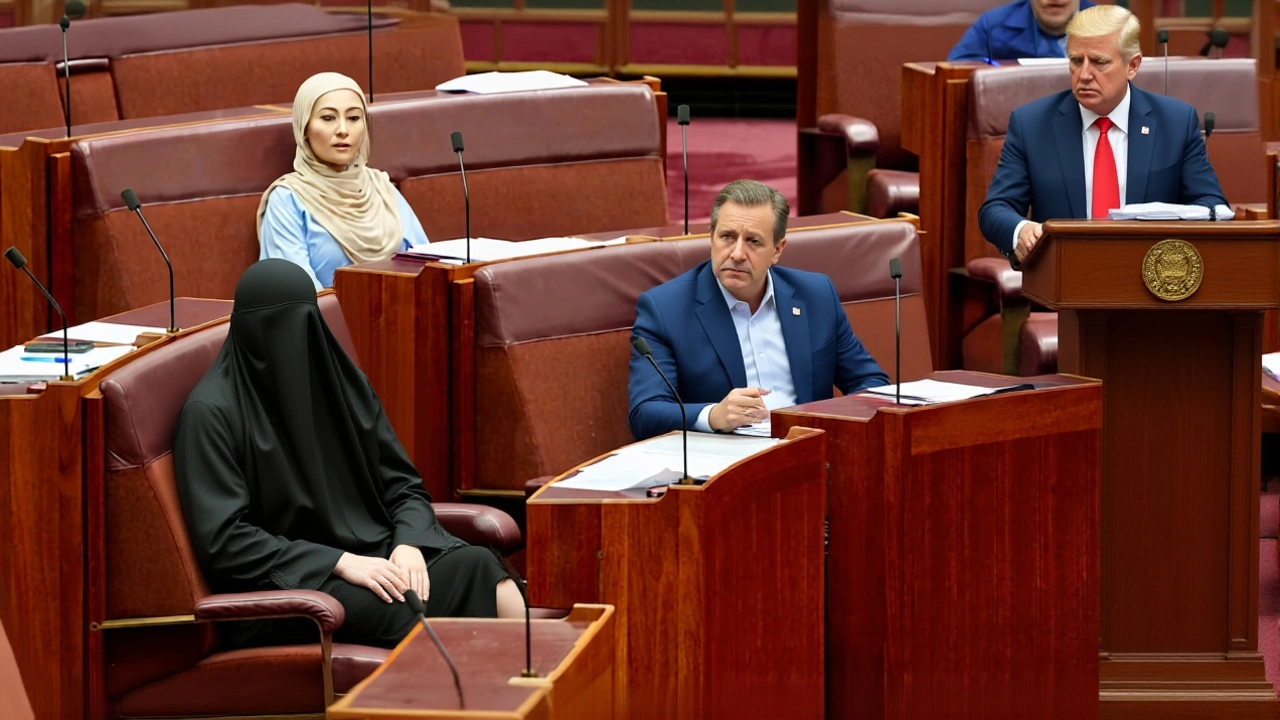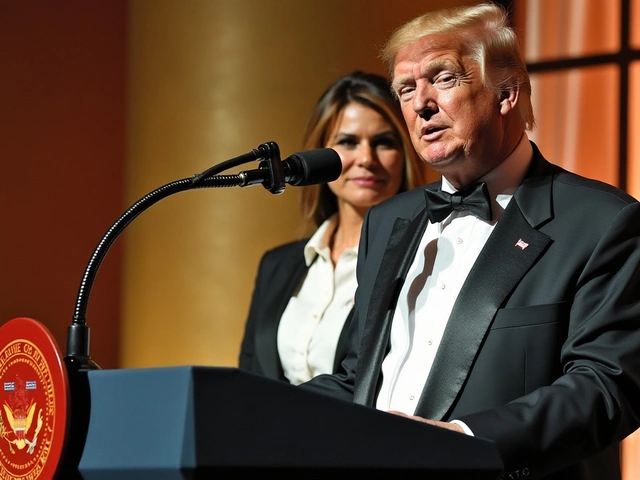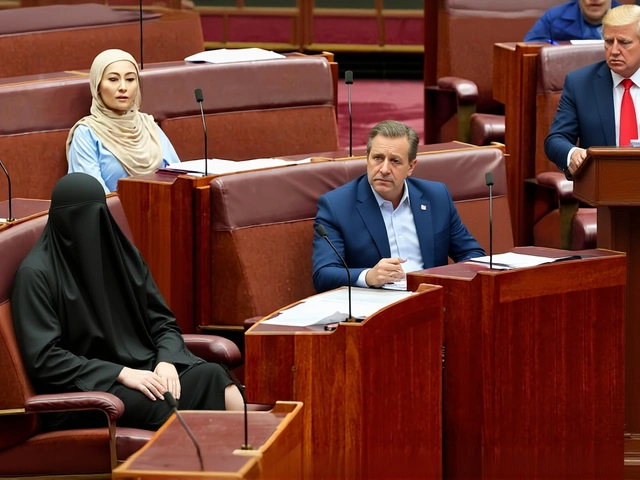On Monday, November 24, 2025, Pauline Lee Hanson, the 71-year-old leader of Pauline Hanson's One Nation, walked into the Australian Senate chamber at Parliament House in Canberra wearing a full-face burqa. It wasn’t a religious statement. It was a provocation. She did it to protest the Senate’s refusal to consider her bill banning full-face coverings in all public spaces — a proposal she first introduced in 2017 and reintroduced this year with identical language. The next day, on November 25, she was suspended. The vote was swift. The anger, palpable. And the fallout? Far from over.
"They denied me the right to wear it"
Hanson’s stunt wasn’t new. Back in August 2017, she wore the same garment during Senate Question Time, triggering a one-day suspension after then-Senate President Stephen Parry ordered her to remove it. This time, she didn’t wait for an order. She sat down, silent, veiled, as senators debated immigration policy. When asked to uncover her face by Senate President Sue Lines, she refused. "There is no dress code on the floor of Parliament," she later told reporters. "Yet I’m not allowed to wear it. So to me, it’s been hypocritical." The Senate didn’t see it that way. By a vote of 41 to 10, she was suspended. But here’s where it gets messy: ABC News reported she’s barred until December 31, 2025 — effectively ending her term’s final six weeks. 7NEWS, citing Senate officials, said it’s a seven-day suspension — the longest imposed on a senator since 1979. The discrepancy hasn’t been resolved. Hanson’s team says she’s appealing. The Senate leadership hasn’t clarified. The confusion itself speaks volumes."It tears at our social fabric"
The response wasn’t just procedural. It was moral. Penny Wong, Australia’s Minister for Foreign Affairs and Senator for South Australia, rose in the chamber at 2:15 PM AEDT on November 25 and delivered a blistering rebuke. "Sen. Hanson’s hateful and shallow pageantry," she said, "mocks and vilifies an entire faith observed by almost one million Australians among a population of 28 million. It tears at our social fabric. And it has cruel consequences — in our school yards." Wong’s words weren’t empty rhetoric. According to the 2021 Australian Bureau of Statistics census, 998,000 Australians identify as Muslim. That’s nearly 3.6% of the population — and growing. Many are second-generation Australians. Their daughters wear hijabs in public schools. Their mothers shop in multicultural suburbs like Lakemba or Fairfield. To them, Hanson’s burqa wasn’t protest. It was performance. A grotesque caricature meant to frighten."A pattern of behavior"
Australian Federation of Islamic Councils, the country’s largest Muslim advocacy group, issued a statement on the same day. Its president, Rateb Jneid, called Hanson’s actions "part of a pattern of behavior that has repeatedly vilified Muslims, migrants and minorities." He pointed to her 1996 maiden speech, where she warned Australia was "in danger of being swamped by Asians" — a line that launched her political career and set the tone for decades. Hanson’s party, founded in 1997, has never held a seat in the House of Representatives. But it holds four Senate seats — enough to sway close votes. Her strategy has always been the same: provoke, polarize, profit. Her rallies draw crowds of disaffected voters. Her media appearances draw outrage. And outrage, she knows, translates to donations and votes.
Who’s next? Barnaby Joyce at the steak dinner
Later that same day, November 25, Hanson hosted Barnaby Joyce, the 58-year-old former Deputy Prime Minister and ex-leader of the National Party, for a steak dinner in her Parliament House office. Joyce, who resigned from politics in 2022 after a scandal involving an affair with a staffer, has been quietly considering a return. He didn’t commit. But he didn’t walk away either. "I’ll make my decision by Friday," he told reporters outside the building. His presence was symbolic. A former major party leader, sitting across from Australia’s most divisive senator, eating steak in the same room where she was just suspended. Is Joyce testing the waters? Is he weighing whether the populist tide still has legs? If he joins One Nation, it could reshape Australia’s right-wing landscape. And if he doesn’t? Hanson will still have her platform — and her suspension won’t silence her. She’ll be back in 2028, campaigning again.What’s really at stake?
This isn’t about clothing. It’s about belonging. Who gets to define Australian identity? Who gets to be seen — and who gets to be feared? Hanson’s bill, if passed, would ban burqas and niqabs in government buildings, public transport, schools, and hospitals. But it wouldn’t stop at clothing. It would criminalize anonymity in public spaces — a move that could affect anyone wearing a helmet, ski mask, or even a face covering during a protest. The law, as written, is vague. The intent? Clear. Australia has long prided itself on multiculturalism. But the cracks are showing. Rising housing costs, stagnant wages, and the erosion of public services have fueled resentment. Hanson didn’t create that anger. She weaponized it.
What happens now?
Hanson’s suspension expires either in seven days or at year’s end — depending on who you believe. But her influence won’t. Her bill will likely be reintroduced again. Her rallies will continue. And her supporters — many of them older, rural, and feeling left behind — will keep showing up. Meanwhile, Muslim communities are organizing. Mosques are hosting open days. Schools are adding cultural awareness programs. And in quiet kitchens across Sydney, Melbourne, and Brisbane, mothers are teaching their daughters: "You belong here. No one gets to tell you otherwise." The real battle isn’t in the Senate chamber. It’s in the classrooms, the shopping centers, the workplaces. And it’s being fought not with veils — but with dignity.Frequently Asked Questions
Why was Pauline Hanson suspended for wearing a burqa?
Hanson was suspended for deliberately wearing a burqa during Senate proceedings to protest the rejection of her bill banning full-face coverings. Senators ruled her act was not a legitimate form of protest but an intentional disruption designed to mock and vilify Muslims, violating parliamentary decorum and dignity. Her refusal to remove the garment when asked escalated the breach.
How many Muslims live in Australia, and how did they respond?
According to the 2021 Australian Bureau of Statistics census, 998,000 Australians identify as Muslim — about 3.6% of the population. The Australian Federation of Islamic Councils condemned Hanson’s stunt as part of a long pattern of vilification, while community leaders organized open mosque days and school education initiatives to counter misinformation and foster inclusion.
Is there a dress code in the Australian Senate?
There’s no formal written dress code, but longstanding convention requires senators to dress with dignity and respect for the institution. Wearing religious or political garments to make a statement — especially one perceived as mocking — is considered a breach of decorum. Past cases, like Hanson’s 2017 suspension, set precedent that symbolic protests crossing into ridicule are not protected speech in the chamber.
What’s the status of Hanson’s burqa ban bill?
Hanson’s bill, identical to the one she introduced in 2017, was rejected by the Senate in November 2025. It proposed banning full-face coverings in all public spaces, including schools, transport, and government buildings. With no crossbench support and bipartisan opposition, it has no chance of passing. But Hanson has vowed to reintroduce it again — likely before the next federal election in 2028.
Why is Barnaby Joyce’s meeting with Hanson significant?
Joyce, a former Deputy Prime Minister and National Party leader, represents a potential bridge between mainstream conservatism and the far-right populist movement. His presence at Hanson’s office signals he’s seriously considering a political return — possibly to One Nation. If he joins, it could legitimize her party and shift the balance of power in the Senate, giving her more leverage on future legislation.
Could this suspension be overturned?
Hanson’s legal team is appealing through parliamentary channels, arguing her right to free expression was infringed. But precedent favors the Senate’s authority to regulate its own conduct. Past suspensions for similar conduct — including her 2017 one-day ban — were upheld. While the duration may be clarified, overturning the suspension entirely is unlikely.





